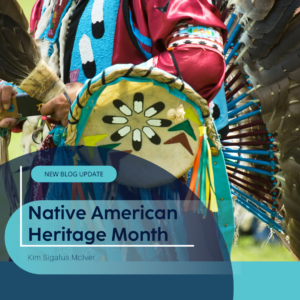 The Greater Freeport Partnership is committed to promoting, equity, celebrating diversity, and creating a culture of belonging in Freeport and Stephenson County. November commemorates Native American Heritage Month and the impact of Native culture in our communities.
The Greater Freeport Partnership is committed to promoting, equity, celebrating diversity, and creating a culture of belonging in Freeport and Stephenson County. November commemorates Native American Heritage Month and the impact of Native culture in our communities.
Kim Sigafus McIver is an award-winning author, speaker and Illinois Road Scholar on Native culture and history. She is a member of the Ojibwa tribe and a resident of Stephenson County. We are grateful to her for sharing her thoughts with our community for this commemorative month.
In April this year, the U.S. Department of the Interior placed 130 acres into a trust for the Prairie Band Potawatomi, giving it sovereignty over the land that the U.S. auctioned off 175 years ago. This is the village of Shabbona in southern DeKalb County. Illinois used to be 1 of 7 states that did not have any federally recognized tribes. Illinois now has its first native lands protected. Illinois is now headed in the right direction. The Native Americans or First People are still here and will continue to be a great nation.
The Potawatomi were among several tribes that lived in Illinois. The Kickapoo, Miami, Sauk and Fox were also here as well as the Ho-Chunk and many other tribes. In the 1830’s, the government removed them from this land and moved them west of the Mississippi River. Many tribes east of that river were also moved, and the northern Trail of Tears runs through the bottom of our state where the Cherokee passed through in the winter in 1832.
The natives in Illinois were considered woodland indians. They hunted Bison until 1810, they fished, they canoed the rivers and Great Lakes and lived off the land. They tended big gardens, did berry-picking, and raised their families as peaceful as possible.
Traditionally during this time of year, they would finish harvesting their gardens and preparing for winter. Winter was the time when they split up into smaller groups and hunkered down for the cold season. It was a time of stories that were passed down from elders, and a time for quiet thought and mediation on the upcoming year.
When the white settlers came along, it was sporadic at first, and then more and more came, until the native lands were overrun with them. The government was no help, as they were more interested in selling the land and making some money. This is how the Prairie Band of Potawatomi lost their land.
People who didn’t understand the culture, took away the culture. Fear, mistrust, and just plain ignorance was part of the downfall of the native way of life. Native Americans were left with missionaries trying to save their souls, and boarding schools trying to take every piece of themselves away.
But they persevered, and they still do. They will continue to be a culture people can learn from and honor.



